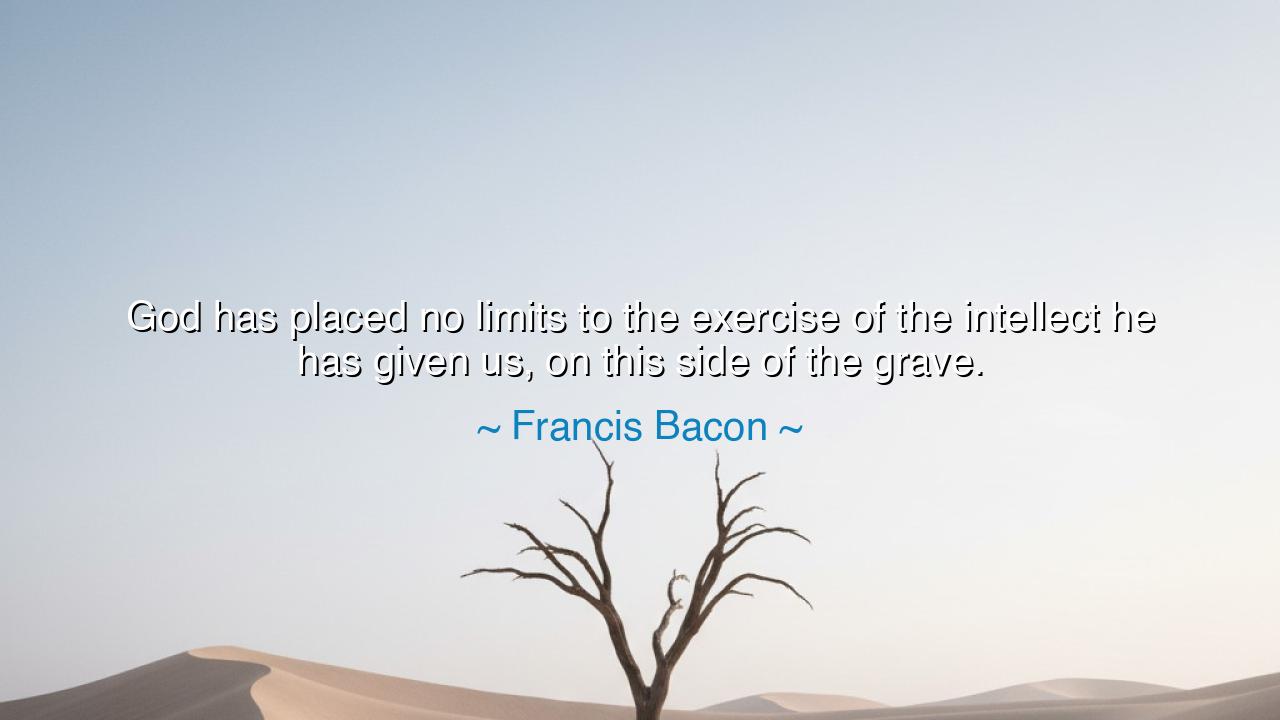
God has placed no limits to the exercise of the intellect he has
God has placed no limits to the exercise of the intellect he has given us, on this side of the grave.






"God has placed no limits to the exercise of the intellect he has given us, on this side of the grave." — Francis Bacon
Thus spoke Francis Bacon, the philosopher of the dawn of modern science — a man who looked upon ignorance as darkness and upon knowledge as light. His words resound across the centuries as both a declaration and a command: that the intellect, that divine spark within humankind, was not meant to rest, nor to bow before the walls of fear or dogma. In this saying, Bacon reveals his faith in the boundless potential of the human mind — that God Himself has set no boundaries upon thought, and that to use our reason is not rebellion, but reverence. For in the pursuit of understanding, we do not flee from the divine — we approach it.
In Bacon’s age, the world trembled between two eras: the old world of superstition and the new world of discovery. The telescope had just unveiled the heavens, and the printing press had given voice to a thousand minds. Yet still, many believed that inquiry was dangerous — that too much knowledge would lead to ruin, as if the intellect were a serpent in the garden of God. Against this fear, Bacon stood as a herald of courage. He proclaimed that the human mind was created to explore, that to question was to honor the Creator. “For,” he believed, “if God had wanted man’s understanding confined, He would not have given him such power to reason.” Thus, Bacon became the father of empiricism, urging all who sought truth to trust not only faith, but also observation, logic, and experiment.
When Bacon declares that no limits are placed on the intellect, he speaks not of pride, but of purpose. He reminds us that curiosity is sacred, that the mind was meant to ascend beyond ignorance just as the body reaches beyond the earth. The only boundaries that exist are those we impose upon ourselves — through fear, laziness, or blind obedience. The grave he mentions is the final rest, the end of earthly striving; but until that moment, we are free — indeed, commanded — to seek, to question, to know. Each question answered is a step closer to the divine order, for truth is the language in which God wrote the universe.
Consider the tale of Galileo Galilei, who gazed through his telescope and saw the moons of Jupiter dancing around their planet. In that vision, he shattered an age-old belief that all things circled the Earth. But his revelation was met not with celebration, but with persecution. Men of power called his discoveries heresy, demanding that he silence his mind. Yet Galileo, even under threat, whispered, “And yet it moves.” He, like Bacon, understood that the intellect is sacred — that to use it is not to defy God, but to honor His creation. Though his body was confined, his spirit remained limitless, proving that no prison can bind the mind that seeks truth.
Bacon’s words also hold a moral lesson for all generations: that the mind is a divine trust, and to leave it idle is to waste a gift from Heaven. Each of us is born with the capacity to think, to create, to discover — yet many live as though that gift were a burden. We settle for comfort, we accept the easy answer, and in doing so we chain our own intellect. But Bacon’s teaching calls us higher: to labor with thought as with faith, to see in every mystery not danger, but invitation. For the Creator gave no limits to thought — only the courage to use it rightly.
The intellect, Bacon believed, must be guided by virtue. Knowledge without humility breeds arrogance, and reason without morality becomes ruin. The power to know is immense, but it must be tempered by the wisdom to use knowledge for good. The true seeker, therefore, is not only a thinker but a servant — one who uses reason to uplift, not to dominate. This harmony between mind and morality is the highest form of worship: to study creation with awe, to act with integrity, and to speak truth with compassion.
So, my child of thought and light, remember this teaching: think boldly, question deeply, and learn endlessly. Do not fear the unknown; it is the canvas upon which your intellect was meant to paint. Read, observe, experiment, and wonder — for each act of inquiry is a prayer of the mind. Let no man, no authority, no tradition tell you that truth is forbidden, for even God placed no limits upon it. The only grave that can hold your intellect is the one you dig with apathy and fear. Live instead as Bacon lived — with your eyes open and your mind aflame — for in the boundless exercise of your intellect, you will glimpse the infinite mind of God.






AAdministratorAdministrator
Welcome, honored guests. Please leave a comment, we will respond soon